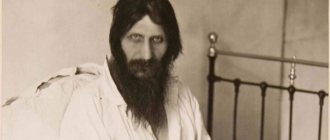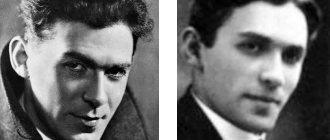Who is this huge, bear-like man with a spade beard and crazy gray eyes? A parasite on the body of the royal family? A petty swindler whose historical role has been greatly exaggerated? Wise old man, magician and healer? "Russia's greatest love machine"? Or simply Grigory Rasputin, symbol of the collapse of old Russia?
Politics is a dirty business. And also very interesting and profitable. If a weak-willed person is at the helm of the state, enterprising people will certainly appear next to him, who at different times were called “favorites”, “gray cardinals” or “informal leaders”. The political career of most behind-the-scenes intriguers is short, and their fate after that is unenviable. But one such favorite became the most popular myth in the popular culture of the 20th century.
This song must be on here
In the middle of the 19th century, a peasant from the village of Pokrovskoye, Tobolsk province, Efim Yakovlevich Rasputin married the girl Anna. The wife repeatedly gave birth to daughters, but they died. The first boy, Andrei, also died. From the 1897 census it is known that on January 10, 1869 (the day of Gregory of Nyssa according to the Julian calendar), her second son was born, named after the calendar saint. But the registry books of the rural church were not preserved, and later Rasputin gave different dates of his birth, hiding his real age. Therefore, the exact day and year of Rasputin’s birth are still unknown.
"Debauch" means a dissolute, immoral person. Previously, the names Rasputa and Besputa were in use. Later, through patronymics, they turned into surnames (for example, Savka, Rasputin's son), especially popular in the North.
Rasputin in a carriage
Rasputin's father drank a lot at first, but then he came to his senses and started a household. In the winter he worked as a coachman, in the summer he plowed the land, fished and unloaded barges. Young Gregory was frail and dreamy, but this did not last long. Having barely matured, he began to fight with peers and parents and to go on wild walks. Once he managed to drink away a cart with hay and horses at a fair, after which he walked home eighty miles. Fellow villagers recalled that already in his youth he possessed powerful sexual magnetism. Grishka was caught more than once with girls and beaten.
Soon Rasputin began to steal, for which he was almost deported to Eastern Siberia. Once he was beaten for yet another theft - so much so that Grishka, according to the villagers, became “strange and stupid.” Rasputin himself claimed that after being stabbed in the chest with a stake, he was on the verge of death and experienced “the joy of suffering.”
The trauma did not pass without a trace - Rasputin stopped drinking and smoking, married Praskovya Dubrovina from a neighboring village (choosing, like his father, an older girl), had children and began visiting holy places.
Rasputin with his children. From left to right: Matryona, Varya, Mitya
His family laughed at him. He did not eat meat or sweets, heard voices, walked from Siberia to St. Petersburg and back, and ate alms. In the spring, he had exacerbations - he did not sleep for many days in a row, sang songs, shook his fists at Satan and ran in the cold in only a shirt. His prophecies consisted of calls to repentance “before trouble comes.” Sometimes, by coincidence, trouble happened the very next day (huts burned, livestock got sick, people died) - and the peasants began to believe that the blessed man had the gift of foresight. He gained followers... and followers.
This went on for about ten years. Rasputin learned about the Khlysty (sectarians who beat themselves with whips and suppressed lust through group sex), as well as the Skoptsy (preachers of castration) who separated from them. He didn’t like the Skoptsy, but he seemed to have adopted part of the teachings of the Khlysty and more than once personally “saved” pilgrims from sin in the bathhouse.
Rasputin with his fans (mostly female fans)
Rasputin in 1907. He was not yet forty, but his beard and years of wandering on foot gave him the appearance of an “old man.”
At the “Christian” age of 33, Gregory begins to storm St. Petersburg. Having secured recommendations from provincial priests, he settles with the rector of the Theological Academy, Bishop Sergius, the future Stalinist patriarch. He, impressed by the exotic character, introduces the “old man” to the powers that be. Thus began the path of the “man of God” to glory.
Rasputin's first loud prophecy was the prediction of the death of our ships at Tsushima. Perhaps he got it from newspaper news reports that a squadron of old ships had sailed to meet the modern Japanese fleet without observing secrecy measures.
The last tsar from the House of Romanov was distinguished by his superstition. He considered himself Job, doomed to trials, and kept meaningless diaries, where he shed virtual tears as he watched his country go downhill. The queen also lived in isolation from the real world and believed in the supernatural power of the “elders of the people.” Knowing this, her friend, the Montenegrin princess Milica, took outright madmen and swindlers to the palace. The monarchs listened to their ravings with childish delight.
For a long time, only daughters were born in the Romanov family. To conceive a son, the queen resorted to the help of the French magician Philip. It was he, and not Rasputin, who was the first to take advantage of the spiritual naivety of the royal family. The scale of the chaos that reigned in the minds of the last Russian monarchs (one of the most educated people of that time) can be judged by the fact that the queen felt safe thanks to a magic icon with a bell that supposedly rang when evil people approached.
The war with Japan, the revolution of 1905 and the illness of the prince finally crippled the Romanovs. Everything was ready for Rasputin's appearance.
Nikki and Alix during their engagement (late 1890s)
The first meeting of the Tsar and Tsarina with Rasputin took place on November 1, 1905 at the palace over tea. He dissuaded the monarchs from escaping to England (according to rumors, they were already packing their things, which most likely would have saved them from death and would have sent Russian history in a different direction). The next time he gave the Romanovs a miraculous icon (found on them after the execution). Then he allegedly healed Tsarevich Alexei, who had hemophilia, and eased the pain of Stolypin’s daughter, wounded by terrorists. The shaggy man captured the hearts and minds of the august couple.
The Emperor personally allowed Gregory to change his dissonant surname to “New” (which, however, did not stick). Soon Rasputin-Novykh acquired another lever of influence at court - the young maid of honor Anna Vyrubova, who idolized the “elder”, a close friend of the queen (according to rumors, even slept with her in the same bed). He became the confessor of the Romanovs and came to the tsar at any time without making an appointment for an audience.
Rasputin with the queen and princesses
At court, Gregory was always “in character,” but outside the political scene he was completely transformed. Having bought himself a new house in Pokrovskoye, he took noble St. Petersburg fans there. There the “elder” put on expensive clothes, became self-satisfied, and gossiped about the king and nobles. Every day he showed the queen (whom he called “mother”) miracles: he predicted the weather or the exact time of the king’s return home.
It was then that Rasputin made his most famous prediction: “As long as I live, the dynasty will live.”
Please note: in most of the photographs Gregory has one hand raised
The growing power of Rasputin did not suit the court. Cases were brought against him, but each time the “elder” very successfully left the capital, going either home to Pokrovskoye or on a pilgrimage to the Holy Land. In 1911, the Synod spoke out against Rasputin. Bishop Hermogenes (who ten years ago expelled a certain Joseph Dzhugashvili from the theological seminary) tried to drive out the devil from Gregory and publicly beat him on the head with a cross. Rasputin was under police surveillance, which did not stop until his death.
Secret agents watched through the windows the most piquant scenes from the life of a man who would soon be called “the holy devil.” Once suppressed, rumors about Grishka’s sexual adventures began to fan with renewed vigor. The police recorded Rasputin visiting bathhouses in the company of prostitutes and wives of influential people. Copies of the Tsarina’s tender letter to Rasputin circulated around St. Petersburg, from which it could be concluded that they were lovers. These stories were picked up by newspapers - and the word “Rasputin” became known throughout Europe.
Rasputin, Bishop Hermogenes and Hieromonk Iliodor. Rasputin actually had neither church nor monastic rank. However, according to his daughter’s stories, St. favored him. John of Kronstadt, also considered a healer
People who believed in Rasputin’s miracles believe that he himself, as well as his death, were mentioned in the Bible itself: “And if they drink anything deadly, it will not harm them; They will lay hands on the sick, and they will recover” (Mark 16-18). Today, no one doubts that Rasputin really had a beneficial effect on the physical condition of the prince and the mental stability of his mother. How did he do it?
The queen at the bedside of the sick heir
Contemporaries noted that Rasputin’s speech was always incoherent; it was very difficult to follow his thoughts. Huge, with long arms, a tavern floorman's hairstyle and a spade beard, he often talked to himself and patted his thighs. Without exception, all of Rasputin's interlocutors recognized his unusual look - deeply sunken gray eyes, as if glowing from within and fettering your will. Stolypin recalled that when he met Rasputin, he felt that they were trying to hypnotize him.
This certainly influenced the king and queen. However, it is difficult to explain the repeated relief of the royal children from pain. Rasputin's main healing weapon was prayer - and he could pray all night long. One day in Belovezhskaya Pushcha the heir began to experience severe internal bleeding. Doctors told his parents that he would not survive. A telegram was sent to Rasputin asking him to heal Alexei from a distance. He quickly recovered, which greatly surprised the court doctors.
Rasputin and the Tsarina are drinking tea. Contrary to obscene rumors, they could not have been lovers - the queen perceived Gregory as a friend and saint
The man who called himself “little fly” and appointed officials by telephone call was illiterate. He learned to read and write only in St. Petersburg. He left behind only short notes filled with terrible scribbles. Until the end of his life, Rasputin looked like a tramp, which sometimes prevented him from “picking” prostitutes for regular orgies. The wanderer quickly forgot about a healthy lifestyle - he drank and drunkenly called ministers with “petitions,” the failure of which was career suicide.
Rasputin did not save money, either starving or throwing it left and right. He even influenced the country’s foreign policy, twice persuading Nicholas not to start a war in the Balkans, convincing the tsar that the Germans were a dangerous force, and the “brothers,” that is, the Slavs, were pigs. However, he still could not dissuade the tsar from getting involved in the First World War.
Letters from Rasputin with petitions
When World War I finally began, Rasputin expressed a desire to come to the front to bless the soldiers. The commander of the troops, Grand Duke Nikolai Nikolaevich, promised to hang him on the nearest tree. In response, Rasputin gave birth to another prophecy that Russia would not win the war until an autocrat (who had a military education, but showed himself to be an incompetent strategist) stood at the head of the army. The king, of course, led the army. With consequences known to history.
Politicians actively criticized the Tsarina, the “German spy,” not forgetting Rasputin. It was then that the image of a “gray eminence” was created, resolving all state issues, although in fact Rasputin’s power was far from absolute. German Zeppelins scattered leaflets over the trenches, where the Kaiser leaned on the people, and Nicholas II on Rasputin’s genitals. The priests did not lag behind: someone started a rumor that killing Grishka was a good thing, for which “forty sins would be removed.”
On July 29, 1914, the mentally ill Khionia Guseva stabbed Rasputin in the stomach, shouting: “I killed the Antichrist!” Witnesses said that from the blow “Grishka’s guts came out.” The wound could have been fatal, but Rasputin pulled out. According to his daughter’s recollections, since then he had changed - he began to get tired quickly and took opium for pain.
Rasputin's death is even more mysterious than his life. The scenery of this drama is well known: on the night of December 17, 1916, Prince Felix Yusupov, Grand Duke Dmitry Romanov (rumored to be Yusupov’s lover) and deputy Purishkevich invited Rasputin to the Yusupov Palace. There he was offered cakes and wine, generously flavored with cyanide. To the horror of the killers, this had no effect on Rasputin. Most likely, the sugar in the cakes neutralized the poison.
Rasputin's killers: Dmitry Romanov, Felix Yusupov and Vladimir Purishkevich
What was Rasputin poisoned with?
Potassium cyanide (KCN) is very similar to sugar.
Cyanides are one of the few substances that can dissolve gold. In the human body, they prevent cells from absorbing oxygen, which leads to rapid death. The lethal dose of potassium cyanide for humans is about 1.7 milligrams per kilogram of weight. The aqueous cyanide solution has a faint almond odor, although some people do not smell it. In Southeast Asia, it is used instead of dynamite for fishing: poison is poured near the reef and fish are collected (still alive for sale to aquarists and dead for food). About 150,000 tons of cyanide are used for this annually.
Today, at the site of Rasputin's murder, you can see a reconstruction of this scene with wax figures.
“Plan B” was put into action: Yusupov shot Rasputin in the back with a revolver. While the conspirators were preparing to get rid of the body, he suddenly came to life, tore the shoulder strap off Yusupov’s shoulder and ran into the street. Purishkevich was not taken aback - with three shots he finally knocked down the “old man”, after which he only clanked his teeth and wheezed.
To be sure, he was beaten again, tied with a curtain and thrown into an ice hole in the Neva. The water that killed Rasputin’s older brother and sister also took the life of the fatal man. A study of the body, caught three days later, showed the presence of water in the lungs. This indicated that Grishka, even after poisoning and severe wounds, was still alive. However, the autopsy report has not been preserved, so this belongs to the realm of rumors.
Dead Rasputin
The Tsarina was furious and wanted the murderers to be shot on the spot, but at the insistence of Nicholas II they escaped with exile. Part of the matter is that the tsar did not want to execute a prince from the imperial family and give rise to a scandal in a turbulent time. But most importantly, he saw that the people glorified them as deliverers from “dark forces.” Rasputin was called a demon, a German spy or the empress's lover. But the Romanovs were faithful to him to the end: the most odious figure in Russia was buried in Tsarskoe Selo.
Perhaps the tsar would have set things in motion over time, but two months later the February revolution broke out. Rasputin's prediction about the fall of the monarchy came true. On March 4, 1917, the minister of the new government, Kerensky, ordered the body to be dug up and burned. The exhumation took place at night, and, according to rumors, the burning corpse tried to rise. This was the final touch to the legend of Rasputin's superpower. True, in fact, there might not be any mysticism in this. The person being cremated could move due to the contraction of the tendons in the fire, and therefore they had to be cut.
Not a single documentary filming of Rasputin has survived to this day (perhaps none was ever made). Nevertheless, the “holy devil” gained popularity as a collective image of the “Russian bear” and a symbol of the death of Tsarist Russia.
Rasputin played by Christopher Lee. The irony of fate is that in the 1920s the Lee family communicated with Felix Yusupov
Films have been made about him since the 1920s. Among the performers of the role of Rasputin there were famous cinematic fantasy figures: Christopher Lee (horror film “Rasputin: The Mad Monk”, 1966) and Alan Rickman (“Rasputin: Dark Servant of Fate”, 1996). By the way, Yusupov successfully sued the MGM studio over a film about Rasputin. After this incident, the cinema began to put a warning: “All coincidences with real events are accidental.”
Perhaps someone else considers Rasputin a saint, but science fiction writers have already pronounced their verdict on him: in fictional works, the royal favorite appears as a mega-villain.
For example, in Don Bluth's cartoon "Anastasia" (1997), viewers are offered a rather crazy plot. The Tsar expels the charlatan Rasputin, who sells his soul to the devil in exchange for demonic power and curses the Romanovs, causing a revolution right in 1913. In the best traditions of animation, the magician has an assistant - a white bat named Bartok, and the whole couple suspiciously resembles Disney's vizier Jafar and the parrot Iago.
Evil cartoon sorcerer Rasputin from Anastasia
The most powerful version of Rasputin is described in the Hellboy comics. In it, Rasputin was revived by the seven gods of Chaos in order to use him for their return to our world. Gregory waited until World War II and offered services to the Nazis (who, as you know, were fond of mysticism). He became the head of the secret project “Ragnarok” and on December 23, 1944, he opened a portal to hell, from which the demon boy Hellboy emerged.
As the plot develops, Rasputin realizes that the forces of evil are using him only as a puppet, and dies at the hands of the witch queen Hecate. All that remains of Rasputin is the smallest particle of his soul, imprisoned in his stomach. It is worn around the neck of Baba Yaga, Rasputin’s grandmother.
Writer Valentin Rasputin will be buried in his homeland, in Irkutsk, next to the graves of his daughter and wife
Today in Moscow they say goodbye to the writer Valentin Rasputin. The ceremony continues at this moment. The Cathedral of Christ the Savior will be open until eight in the evening - people come there from the very morning to pay tribute to the memory of the author, whose works have not left readers indifferent for many years.
His most faithful readers came to bid farewell to the great Russian writer. All those for whom Valentin Rasputin became the voice of the Russian village, the people's pain. Those whose lives changed after reading his books, which became part of something very personal, intimate. Some people came specially from Rasputin’s native Siberia to say goodbye.
“This is a man who represented Russia from the depths, this is a man who could express the most intimate, what the people feel from the bottom, from the very root of Russia, great, big, enormous. And he could express this in his works,” says Nikolai Salatsky.
“I came to say goodbye to my fellow countryman, we are from the Irkutsk region. We grew up on these works, our generation. “Farewell to Matera”... What can I say. The last writer of this class has left. Shukshin once left, Astafiev left, now Rasputin has left. There is no one left,” says Valery Korchevsky.
The coffin with the body stands in the center of the Cathedral of Christ the Savior, which was recreated, among other things, thanks to Rasputin - he was one of the initiators of the construction of the temple on the site of one destroyed by the Bolsheviks. The farewell to the writer, who became a classic during his lifetime, will last until 8 pm. Vladimir Putin also came to see off Rasputin on his final journey.
The President expressed his condolences to the writer’s family and friends. The head of the Communist Party faction Zyuganov and the chairman of the Union of Writers of Russia said goodbye to Rasputin.
People stand in line silently. The writer said that in order to “understand and feel each other, you don’t need a lot of words, you need a lot not to understand.” The explorer of the secrets of the Russian soul, it was he, Rasputin, in his famous story “Farewell to Matera” who erected a monument to the Russian village, which irrevocably sunk before our eyes, like Atlantis, under water for the construction of a new hydroelectric power station.
The writer warned: civilization may lose itself in the struggle for technological progress. An almost autobiographical story, like many of Rasputin’s works, they were all experienced by him personally, which is why they sound so piercing and reach the very heart. Like Volodka from “French Lessons,” Valyusha, as Rasputin’s relatives called him, went to high school tens of kilometers from the place where he was born—the village of Atalanka on the banks of the Angara.
“I remember his phrase from “Live and Remember” - “The human conscience has become thinner...” It has become thinner in many ways, but he preserved it, he affirmed it, he had it in everything,” says Valery Ganichev, Chairman of the Board of the Union of Writers of Russia .
“With Valentin Rasputin, we said goodbye to Matera, collected money for Maria, learned to live and love according to the laws of conscience and human justice,” says politician Gennady Zyuganov.
The writer called compassion one of the main feelings - the ability and strength to take on part of the pain of another person. Humanism is in all his works - “Live and Remember”, “Fire”, “Vasily and Vasilisa”.
“Everything that his heroes experienced, “Live and Remember,” for example, Nastya, he passed through his heart. That is, human pain, it passed through him. I think that he will pray for us there,” says Nina Pospelova.
He did not live to see his 78th birthday by just a day. And today in Irkutsk there was supposed to be a presentation of his latest book, “Along the Angara, along the Angara.”
The funeral service for the Russian classic will take place tomorrow in the Cathedral of Christ the Savior. The funeral service will be conducted by Patriarch Kirill. Rasputin will be buried on March 19, as he bequeathed, on his native land, so lovingly sung by him in his works - in Irkutsk, near the graves of his wife and daughter.
Hellboy and his world
Dmitry Zlotnitsky |
10/18/2012 | 4,037 This red-skinned demon smells like roasted peanuts, files his horns, wears a cross, and can kick some serious ass.
One of the adventures in the tabletop role-playing game Pathfinder is dedicated to the hunt for Rasputin. And Rasputin had every chance of becoming the main villain in one of Boris Akunin’s books. To convincingly describe Grishka, the writer carefully studied all the archives... and abandoned the idea. It turned out that the real Rasputin is not a great dark lord, but rather even a victim of court “showdowns” for power.
Rasputin, a supervillain from the comic book "Hellboy"
Life of Rasputin
Grigory Efimovich Rasputin was born in 1869 in the West Siberian village of Pokrovskoye. He called himself "The Elder", a mendicant. A religious preacher who never had a theological education. How this pious vagabond became one of the most influential figures in Russia, posthumously eulogized in the song by Boney M. “Lover of the Russian Queen” is considered one of the most popular mysteries of the 20th century.
The sources available today allow us to analyze his life in some detail, because almost all the people around him wrote something about him: the Imperial Family, his Jewish secretary, his assassins. Several years ago, Russian playwright and historian Edward Radzinsky made a valuable addition to The Rasputin X-Files. Radzinsky received from an auction at Sotheby's (One of the oldest auction houses in the world) a carefully bound 426-page material about the death of Rasputin, published in 1917.
* * *
“Who are you, Mr. Rasputin?” - such a question might have been asked by British and German intelligence at the beginning of the 20th century. A clever werewolf or a simple-minded fanatic? Rebel saint or sexual psychopath? To cast a shadow on a person, it is enough just to correctly illuminate his life.
It is reasonable to assume that the true appearance of the royal favorite was distorted beyond recognition by “black PR”. And minus the incriminating evidence, what appears before us is an ordinary man - illiterate, but very cunning, who achieved fame thanks to a successful coincidence of circumstances and the Romanovs’ obsession with religious mysticism.
This is interesting
- The Yusupov family originates from the nephew of the Prophet Mohammed. Irony of fate: a distant relative of the founder of Islam killed a man who considered himself an Orthodox saint. However, the church does not recognize Rasputin as a saint, pointing to his dubious morality.
- After the overthrow of the Romanovs, Rasputin’s activities were investigated by a special commission, of which the poet Blok was a member. The investigation was never completed.
- Rasputin's daughter Matryona managed to emigrate to France and then to the USA. There she worked as a dancer and tiger trainer. She died in 1977. The remaining family members were dispossessed and exiled to camps, where their trace was lost.
short biography
Name: Rasputin Grigory Efimovich
Years of life: January 9, 1969 - December 17, 1916
State: Russian Empire
Field of activity: Politics, religion
Greatest achievement: Became an adviser to the imperial family, had influence on Alexandra Feodorovna Romanova and through her on state policy
Grigory Efimovich Rasputin was born in 1869 in the West Siberian village of Pokrovskoye.
As a child, he had developmental problems, as a result of which in his youth he led an immoral lifestyle and violated the law.
Tired of this way of life, Rasputin turned to faith. He became a religious elder, a traveling healer.
The people recognized a certain healing and prophetic gift in Rasputin, which one day led to his acquaintance with the imperial family.
Rasputin was the only one who could cope with the symptoms of hemophilia that tormented Tsarevich Alexei, which allowed the elder to constantly be at court and also influence the decisions of the empress.
The activities of Rasputin and his influence on the royal family could not but cause protest from part of the top of the state, which subsequently led to the murder of Rasputin by Felix Yusupov.
He was considered a miracle worker and an anarchist: Grigory Rasputin was born into a farming family and rose to become an adviser to the family of the Russian emperor. Not everyone appreciated his soaring career. In 1916, Rasputin became the victim of a brutal murder.
On December 19, 1916, a man was discovered on the ice of the Neva River in St. Petersburg. His face was disfigured, his skull was dented, and his right eye was knocked out. He was shot several times. However, this man was still alive and tried to remove the shackles. This almost dead man was Grigory Rasputin.
In their report, the police wrote that on the days of the funeral, many came to the banks of the Neva to scoop up water into buckets and glasses - with water was the power of the dead, which could work miracles, as was believed at that time in Russia.











